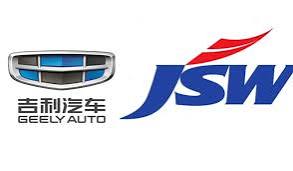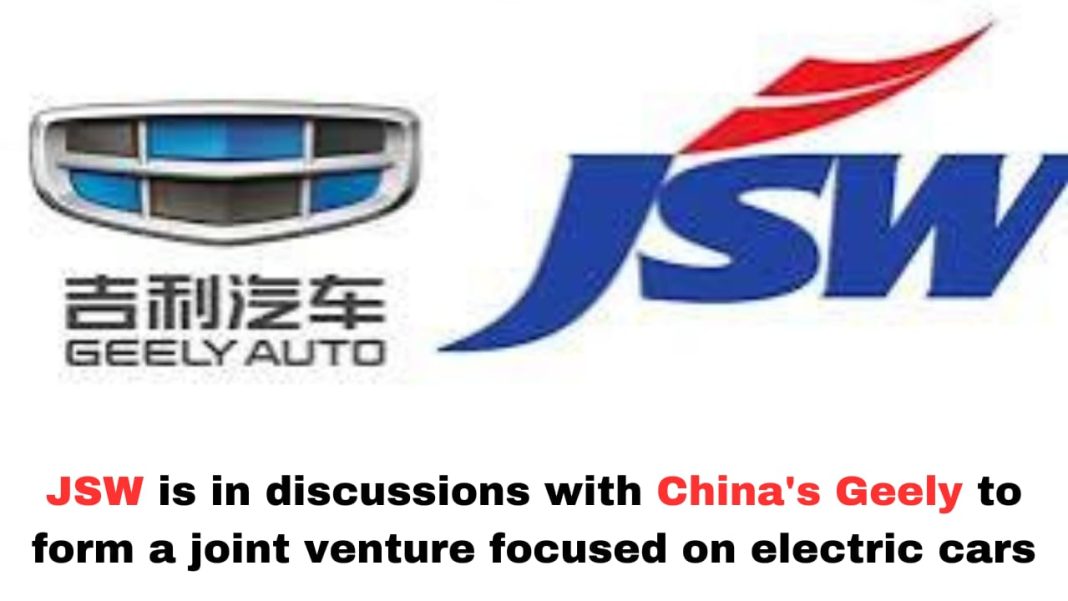Digital News Guru Automobile Desk:
JSW Group Explores EV Joint Venture with China’s Geely
JSW Group, a prominent Indian conglomerate with diversified interests in steel, energy, and infrastructure, is actively pursuing opportunities in the electric vehicle (EV) sector. Recent reports indicate that JSW is in discussions with China’s Geely Automobile Holdings to establish a joint venture focused on electric cars, aiming to capitalize on the growing demand for EVs in India.

Strategic Intentions and Market Positioning
JSW’s potential collaboration with Geely underscores its commitment to entering the EV market with a competitive edge. By leveraging Geely’s technological expertise and experience in electric mobility, JSW aims to introduce a range of passenger and commercial electric vehicles tailored to the Indian market. This move aligns with JSW’s broader strategy to diversify its business portfolio and contribute to sustainable transportation solutions in India.
Existing Partnerships and Flexibility
Currently, JSW holds a 35% stake in MG Motor India, a subsidiary of China’s SAIC Motor. This partnership is non-exclusive, allowing JSW the flexibility to explore additional collaborations in the automotive sector. The potential joint venture with Geely indicates JSW’s intent to establish a more substantial presence in the EV market, beyond its existing engagements.
Focus on Battery Manufacturing
Recognizing the critical role of battery technology in the EV ecosystem, JSW Energy, a subsidiary of JSW Group, is in advanced discussions with South Korea’s LG Energy Solution to establish a $1.5 billion joint venture for battery manufacturing. The proposed facility would have a production capacity of 10 gigawatt-hours, with 70% allocated for JSW’s energy storage and EV needs, and the remaining 30% for LG Energy Solution. This collaboration is poised to bolster JSW’s vertical integration in the EV supply chain, ensuring a reliable and efficient battery supply for its vehicles.

Investment Plans and Infrastructure Development
In addition to exploring joint ventures, JSW has announced plans to launch its own electric vehicle brand. The company intends to invest 27,200 crore (approximately $3.2 billion) to set up a dedicated EV manufacturing facility in India. This investment reflects JSW’s commitment to developing the necessary infrastructure to support its EV ambitions and contribute to the growth of the EV ecosystem in the country.
Market Dynamics and Competitive Landscape
India’s EV market is on an upward trajectory, driven by increasing environmental awareness, supportive government policies, and advancements in technology. While the adoption rate of electric vehicles has been gradual, there is a discernible shift towards sustainable transportation solutions. JSW’s entry introduces a formidable competitor to established players like Tata Motors and Mahindra & Mahindra, potentially intensifying market competition and accelerating innovation.
Challenges and Considerations
Despite the promising outlook, JSW may encounter several challenges in its EV venture:
- Infrastructure Development: The establishment of a comprehensive charging infrastructure is imperative to support widespread EV adoption.
- Supply Chain Management: Securing a consistent supply of raw materials, particularly for battery production, is crucial.
- Consumer Acceptance: Overcoming consumer apprehensions regarding EV performance, range, and cost remains a priority.
- Regulatory Compliance: Navigating the regulatory landscape, including safety standards and environmental regulations, is essential for successful operations.
Challenges and Considerations
While the prospects of entering the EV market are promising, JSW may face several challenges:
- Regulatory Environment: Navigating India’s regulatory landscape for electric vehicles, including compliance with safety and environmental standards, will be crucial.
- Market Competition: The Indian EV market is becoming increasingly competitive, with established players and new entrants vying for market share.
- Consumer Adoption: Encouraging consumers to transition from traditional internal combustion engine vehicles to electric alternatives requires addressing concerns related to range, charging infrastructure, and cost.

Future Outlook
JSW’s discussions with Geely and its broader investment plans signify a strategic commitment to becoming a significant player in India’s EV market. By forming strategic partnerships and investing in manufacturing capabilities, JSW aims to leverage its industrial expertise to drive innovation and growth in the electric mobility sector.
As the company advances its plans, it will play a pivotal role in shaping the future of transportation in India, contributing to the country’s goals of reducing carbon emissions and promoting sustainable development.
You May Also Read: The RBI has set up a panel to oversee the ethical use of AI in the financial sector








